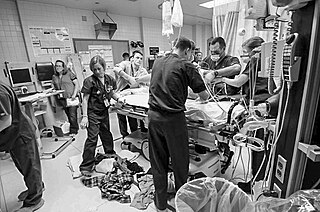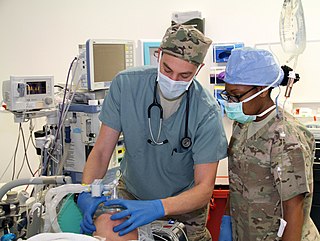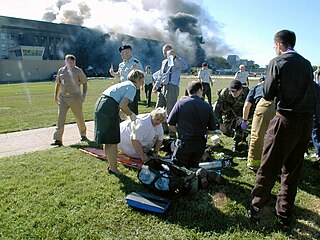
Emergency medicine is the medical speciality concerned with the care of illnesses or injuries requiring immediate medical attention. Emergency physicians specialize in providing care for unscheduled and undifferentiated patients of all ages. As first-line providers, in coordination with emergency medical services, they are primarily responsible for initiating resuscitation and stabilization and performing the initial investigations and interventions necessary to diagnose and treat illnesses or injuries in the acute phase. Emergency medical physicians generally practice in hospital emergency departments, pre-hospital settings via emergency medical services, and intensive care units. Still, they may also work in primary care settings such as urgent care clinics.
In the medical profession, a general practitioner (GP) or family physician is a physician who treats acute and chronic illnesses and provides preventive care and health education to patients of all ages. GPs' duties are not confined to specific fields of medicine, and they have particular skills in treating people with multiple health issues. They are trained to treat patients to levels of complexity that vary between countries. The term "primary care physician" is more usually used in the US. In Asian countries like India, this term has been replaced mainly by Medical Officers, Registered Medical Practitioner etc.

Anesthesiology, anaesthesiology, or anaesthesia is the medical specialty concerned with the total perioperative care of patients before, during and after surgery. It encompasses anesthesia, intensive care medicine, critical emergency medicine, and pain medicine. A physician specialized in anesthesiology is called an anesthesiologist, anaesthesiologist, or anaesthetist, depending on the country. In some countries, the terms are synonymous, while in other countries, they refer to different positions and anesthetist is only used for non-physicians, such as nurse anesthetists.
Hospital medicine is a medical specialty that exists in some countries as a branch of family medicine or internal medicine, dealing with the care of acutely ill hospitalized patients. Physicians whose primary professional focus is caring for hospitalized patients only while they are in the hospital are called hospitalists. Originating in the United States, this type of medical practice has extended into Australia and Canada. The vast majority of physicians who refer to themselves as hospitalists focus their practice upon hospitalized patients. Hospitalists are not necessarily required to have separate board certification in hospital medicine.

Residency or postgraduate training is a stage of graduate medical education. It refers to a qualified physician, veterinarian, dentist, podiatrist (DPM) or pharmacist (PharmD) who practices medicine, veterinary medicine, dentistry, podiatry, or clinical pharmacy, respectively, usually in a hospital or clinic, under the direct or indirect supervision of a senior medical clinician registered in that specialty such as an attending physician or consultant. In many jurisdictions, successful completion of such training is a requirement in order to obtain an unrestricted license to practice medicine, and in particular a license to practice a chosen specialty. In the meantime, they practice "on" the license of their supervising physician. An individual engaged in such training may be referred to as a resident, registrar or trainee depending on the jurisdiction. Residency training may be followed by fellowship or sub-specialty training.

Family medicine is a medical specialty within primary care that provides continuing and comprehensive health care for the individual and family across all ages, genders, diseases, and parts of the body. The specialist, who is usually a primary care physician, is named a family physician. It is often referred to as general practice and a practitioner as a general practitioner. Historically, their role was once performed by any doctor with qualifications from a medical school and who works in the community. However, since the 1950s, family medicine / general practice has become a specialty in its own right, with specific training requirements tailored to each country. The names of the specialty emphasize its holistic nature and/or its roots in the family. It is based on knowledge of the patient in the context of the family and the community, focusing on disease prevention and health promotion. According to the World Organization of Family Doctors (WONCA), the aim of family medicine is "promoting personal, comprehensive and continuing care for the individual in the context of the family and the community". The issues of values underlying this practice are usually known as primary care ethics.
A medical specialty is a branch of medical practice that is focused on a defined group of patients, diseases, skills, or philosophy. Examples include those branches of medicine that deal exclusively with children (paediatrics), cancer (oncology), laboratory medicine (pathology), or primary care. After completing medical school or other basic training, physicians or surgeons and other clinicians usually further their medical education in a specific specialty of medicine by completing a multiple-year residency to become a specialist.
A medicalintern is a physician in training who has completed medical school and has a medical degree, but does not yet have a license to practice medicine unsupervised. Medical education generally ends with a period of practical training similar to internship, but the way the overall program of academic and practical medical training is structured differs depending upon the country, as does the terminology used.
The American Board of Medical Specialties (ABMS) is a non-profit organization established in 1933 which represents 24 broad areas of specialty medicine. ABMS is the largest and most widely recognized physician-led specialty certification organization in the United States. The other certification organizations in the United States are the American Board of Physician Specialties and American Osteopathic Association Bureau of Osteopathic Specialists.
The American Board of Family Medicine (ABFM) is a non-profit, independent medical association of American physicians who practice in family medicine and its sub-specialties. Founded in February 1969 as the American Board of Family Practice (ABFP), the group was the 20th medical specialty to be recognized by the American Board of Medical Specialties and was formed out of a need to encourage medical school graduates to enter general practice. It adopted its current name in 2005.
Disaster medicine as a specialty and mindset was not only a reaction from September 11, 2001, but to the numerous subsequent events that seemed to all too quickly follow: random anthrax attacks, the SARS outbreak, the New York City blackout in the summer of 2003, the December 26, 2004 Indian Ocean earthquake and tsunami, the Pakistan earthquake of 2005, tumultuous hurricane seasons in 2004 and 2005 and, of course, terrorist attacks throughout the world — all against a backdrop of conflict in Afghanistan and Iraq.
The medical establishment in North America and the United Kingdom began forming study and discussion groups in disaster medicine. In some cases, the medical schools were on the front lines of this movement. Meanwhile, courses and fellowships in disaster medicine related fields at universities in London, Paris, Brussels, Bordeaux and the United States have been in existence since the early 1980s.
Throughout this period, incomplete and faltering medical responses to disaster events made it increasingly apparent that federal, state and local emergency management organizations were in need of a mechanism to identify qualified physicians in the face of a global upturn in the rate of natural and man-made disasters. Many physicians who volunteer at disasters have a bare minimum of knowledge in disaster medicine and often pose a hazard to themselves and the response effort because they have little or no field response training. It was against this backdrop that the American Academy of Disaster Medicine (AADM) and the American Board of Disaster Medicine (ABODM) were formed for the purpose of scholarly exchange and education in Disaster Medicine as well as the development of an examination demonstrating excellence towards Board Certification in this new specialty.
Board certification is the process by which a physician or other professional demonstrates a mastery of advanced knowledge and skills through written, oral, practical, or simulator-based testing.
The American Board of Physician Specialties (ABPS), the official certifying body for the American Association of Physician Specialists (AAPS) is a non-profit umbrella organization for sixteen medical specialty boards that certifies and re-certifies physicians in fourteen medical specialties in the United States and Canada. It is one of three certifying bodies in the United States in addition to the American Board of Medical Specialties, and American Osteopathic Association Bureau of Osteopathic Specialists. The ABPS oversees Doctor of Medicine (M.D.) and Doctor of Osteopathic Medicine (D.O.) certification in the United States. The ABPS assists its Member Boards in developing and implementing educational and professional standards to evaluate and certify physician specialists. It is recognized by the U.S. Department of Labor as well as the Centers for Medicare and Medicaid Services (CMS).
Established in 1939, the American Osteopathic Association's (AOA) Bureau of Osteopathic Specialists (BOS) is the supervisory body for the AOA's 16 Specialty Certifying Boards in the United States. The BOS establishes and enforces policy for board certification through the AOA Specialty Certifying Boards and maintains high standards for certification through the development and implementation of educational and professional standards used to evaluate and certify osteopathic and non-osteopathic physician.
The American Academy of Disaster Medicine (AADM) was founded in 2006 to promote the science and art of disaster healthcare. It is one of the newest medical organizations in the world. On October 18, 2007 the American Academy of Disaster Medicine was also the first medical organization in history to fulfill a Presidential mandate that called for the formal organization of disaster healthcare. AADM was instrumental in establishing disaster medicine as a recognized medical specialty; a certifying board, the American Board of Disaster Medicine was approved by the American Board of Physician Specialties in 2004. The Academy's headquarters is in Tampa, Florida.

Disaster medicine is the area of medical specialization serving the dual areas of providing health care to disaster survivors and providing medically related disaster preparation, disaster planning, disaster response and disaster recovery leadership throughout the disaster life cycle. Disaster medicine specialists provide insight, guidance and expertise on the principles and practice of medicine both in the disaster impact area and healthcare evacuation receiving facilities to emergency management professionals, hospitals, healthcare facilities, communities and governments. The disaster medicine specialist is the liaison between and partner to the medical contingency planner, the emergency management professional, the incident command system, government and policy makers.
The American Board of Hospital Medicine (ABHM) is a Member Board of the American Board of Physician Specialties (ABPS), the nation's third largest physician multispecialty certifying organization and was founded in 2009. The ABHM is North America's first and only board of certification devoted exclusively to hospital medicine founded by hospitalists and governed by hospitalists.
In 2006, hospice and palliative medicine was officially recognized by the American Board of Medical Specialties, and is co-sponsored by the American Boards of

Physicians are an important part of health care in the United States. The vast majority of physicians in the US have a Doctor of Medicine (MD) degree, though some have a Doctor of Osteopathic Medicine (DO), or Bachelor of Medicine, Bachelor of Surgery (MBBS).
The American Board of Obstetrics and Gynecology is a non-profit organization that provides board certification for practicing obstetricians and gynecologists in the United States and Canada. It was founded in 1927, incorporated in 1930, and is based in Dallas, Texas. It is one of 24 medical boards recognized by the American Board of Medical Specialties. ABOG's mission is to define the standards, certify obstetricians and gynecologists, and facilitate continuous learning to advance knowledge, practice, and professionalism in women's health.





